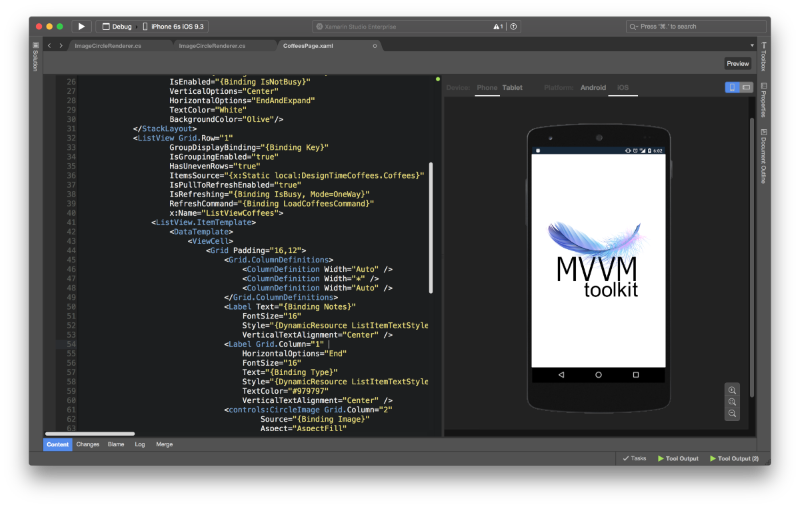Xamarin
About Xamarin
Xamarin Pricing
Xamarin is available for free.
Free trial:
Not Available
Free version:
Available

Most Helpful Reviews for Xamarin
1 - 5 of 60 Reviews
Manthan
Verified reviewer
Computer Software, 501-1,000 employees
Used daily for more than 2 years
OVERALL RATING:
5
EASE OF USE
5
VALUE FOR MONEY
4
CUSTOMER SUPPORT
4
FUNCTIONALITY
5
Reviewed July 2021
Xamarin - An open source mobile app cross platform
We have created our application in very less time compared to previously where we used native platforms to create individual application. It gives us an extra time to create more applications. Also Windows application can be created from a same project.
PROSWe just need to create different UI for different OS. Create a shared project for all back end communication. Can save lot of times from business perspective and create a impactful application.
CONSiOS UI should be created within Xamarin only. No need to open xcode for that.
Reasons for switching to Xamarin
As we wanted to create our application compatible for all platforms including iOS, Android and Windows.
Oussama
Computer Games, 2-10 employees
Used daily for more than 2 years
OVERALL RATING:
5
EASE OF USE
5
FUNCTIONALITY
5
Reviewed January 2023
Xamarin: A Comprehensive Review of its Pros and Cons
Overall, Xamarin is an excellent choice for cross-platform development. It is easy to use, reliable, and the code sharing feature is incredibly helpful for saving time and effort. I would highly recommend Xamarin for anyone looking for a comprehensive cross-platform development solution.
PROSXamarin is an incredibly powerful cross-platform development tool that allows for easy code sharing and a streamlined workflow.
CONSAlthough Xamarin is relatively easy to use, it is not as intuitive as some of the other development tools on the market and lacks some of the more advanced features that could be useful for experienced developers.
Reasons for switching to Xamarin
Xamarin stands out from its alternatives due to its superior code sharing abilities and its ability to integrate with multiple platforms. Additionally, it is compatible with a variety of programming languages, making it an ideal choice for developers of all skill levels.
Arpit
Used daily for less than 12 months
OVERALL RATING:
1
EASE OF USE
1
VALUE FOR MONEY
1
CUSTOMER SUPPORT
1
FUNCTIONALITY
2
Reviewed August 2017
Use something else
Cross-platform development.
PROSIt provides native support using language you already know (C#). If you know C# very deeply then maybe this would right choice for you.
CONSCan't do high level UI stuff. Not cross-platform as they advertise it is. you will end up doing same code for each platform. I'd do native rather than this.
Gabriel
Verified reviewer
Computer Software, 201-500 employees
Used daily for more than 2 years
OVERALL RATING:
4
EASE OF USE
2
VALUE FOR MONEY
5
CUSTOMER SUPPORT
4
FUNCTIONALITY
3
Reviewed January 2019
Probably the best multi-platform framework
To state upfront: I have experience with both native Xamarin and .Forms variants, using Visual Studio as the choice IDE. Development is straightforward and there is plenty of learning material available to enable even mid level .Net developers to become productive in a matter of days. From a product owner's perspective this is the go-to tool when having to target multiple platforms. You get the advantage of being able to target device & platform specific features without the pains of having to use web containers like Cordova or Ionic frameworks) For the standard developer, the biggest pain is the debugging experience. This is usually slow (for instance it lacks the native Android's "Fast deployment" feature) and due to compiler optimizations, Intelisense will barely work (you don't get listings of the available properties & methods, while some property values will not be accessible at all) - although this can be mitigated by using a good logging tool. To add further, the (relatively) new Xamarin Forms will further constraint the developer to use a unified implementation, making the overall product even more maintainable (although this may have limitations when converting existing native apps). All in all, this is a matured product that should always be considered when targeting multi-platform software.
PROS- First and foremost, it's portability that is driving the market. Being able to write a single implementation which targets multiple platforms is extremely cost effective - Being backed up by .Net (extremely common among the software development community) it's far easier to maintain a Xamarin solution (as opposed to having to find native platform developers) - Hardware support is really at an all time high - even hardware producers (e.g.: Motorola) are putting out Xamarin SDKs.
CONS- Perhaps the only true disadvantage is that there is always a delay before it gets updated to support the latest platform update - Debugging can become tedious and I've seen this especially on the native implementations due to Xamarin's less-than-optimal way of reporting an issue (i.e.: you may end up in situations where an error message related to an Android run-time was actually caused by some small layout issue where a needed element is not present)
Richard
Verified reviewer
Computer Software, 11-50 employees
Used daily for less than 2 years
OVERALL RATING:
5
EASE OF USE
4
VALUE FOR MONEY
5
CUSTOMER SUPPORT
3
FUNCTIONALITY
5
Reviewed June 2018
A development delight, if you know what you're doing
Nice unified development environment.
PROSXamarin comes in a few flavours. There is Xamarin.Forms which is a totally unified development experience across all apps. You're more limited & restricted in what you can do, but at the payoff of being able to develop once across all platforms. Xamarin.IOS and Xamarin.Android are C# wrappers for the native libraries, so you're basically writing a native app but in C# and are able to share code between platforms using a portable class library or a .net standard library. Also it's totally free and backed by Microsoft. They keep up to date with the latest libraries really well and has large community support.
CONSThere is a bit of a learning curve with all Xamarin - and certain levels of understanding really help you out. But it can be confusing when you're looking at examples and unsure of how it applies to your own code. Xamarin.Forms has a lot of restrictions, but if your goal is to make a simple native feeling form-y application and don't want to do anything specific, it can save a lot of development time. With Xamarin.IOS and Xamarin.Android you're in a bit of trouble if no one has created bindings for a library you want to use, you can do it yourself but it's not well documented and can be confusing. If you don't like Visual Studio and C# this is not for you.





